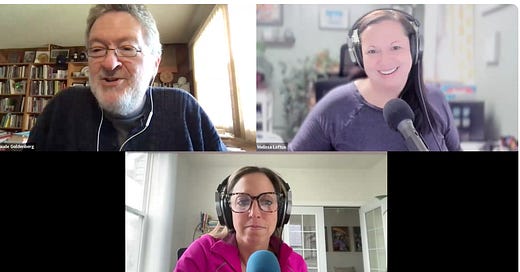Many of you reading aficionados have probably heard of or maybe actually have heard “Melissa & Lori Love Literacy,” a bang-up podcast by 2 former teachers and reading coaches. I was on their podcast last year, or maybe the year before, and had such a blast that when I saw them at a recent conference in Oakland (go here if you missed the brief post about it; still hoping there will be more about it soon), I blurted out, “Can I do an interview with you two for my Substack?!”
As anticipated, it was a lot of fun but also a lot of serious talk about how they got into podcasting, advice they have for “regular teachers” who might start their own podcast, what they’ve learned and been surprised about, and two incidents where guests provided incorrect information, but then contacted Melissa and Lori to come back and correct it. Melissa and Lori say it was inspiring and demonstrated a lot of humility. I would add integrity, too. The three of us agreed how rare that sort of thing is.
Then of course I had to ask them about these darned reading wars that I can’t make go away. They had some pretty interesting things to say about that, despite the fact that no one has any real solutions. They both pointed to hopeful signs, so we did end on a positive—and hopeful—note.
I was planning to keep the convo to not much more than 30 minutes, but it was so interesting and fun we went for almost a full hour.
You have several options for “experiencing” it. Just click the underlined link. Not the screen shot.
Gallery view where you see the 3 of us all the time:
Speaker view where you see one of us—whoever is speaking—at a time:
Audio only (aka podcast mode) suitable for your morning or afternoon listen while you work out.
Transcript if you’d rather read… but you’ll miss much of the fun. If you click on this link the transcript will download onto your computer. You can also see the transcript when you watch one of the video recordings; just widen the window so the transcript appears.
Passcode: 6k2c&q2T
Unfortunately, because I’m such a rookie I didn’t have settings right so that the shared screen would be recorded. This happened for the video chat we did a few weeks ago; you’d think I would have learned.
Fortunately, there was very little shared screen time, and I can make up for it with a simple screen shot, and the important information can be summarized easily: Go to literacypodcast.com to check Melissa and Lori out.
I hope you enjoy our conversation at least a tiny bit as much as I did.








So charming! Thank you for digging into Lori and Melissa’s interesting backstories and the positive ending. More of this will end the wars.
Claude,
I found your blog reframing that "All cues are NOT created equal", very helpful.
Many teachers are critical of the outlawing of strategies linked to 3-cueing, like asking kids "does it sound right, does it make sense?" It was also good to see the application of this nuance in your recent video "how to help your child read words."
However, in this conversation with Lori & Melissa,
You admit there is a lot of contradictory research, you even contradict Lori about Leveled Reading-
Lori, "I really was still doing some what I didn't know at the time were not so great practices of leveled reading, independent reading, just some inefficient stuff saying there is evidence for it."
Claude, "I don't want to contradict anyone, but that's actually not true. And the what works Clearinghouse puts leveled reading in the category of at least promising. And maybe even if oh, yeah, possibly effective."
There are a lot of contradictions like this, it just depends on who decides what research contributes to the "signal" and what goes to the "Noise". There are huge differences in judgements amongst Academics and Evidence Organizations.
Regarding this you imply those that don't promote your judgement "keep people ignorant".
Claude, "Research can be cross-cutting and contradictory. But when you're actively working to keep people ignorant of some very important things that they need to know."
You end with, "it's not about being right. It's about getting it right."
But all along you imply you are right and that those who don't judge the research the way you do are "flat earthers" and they have to "jump the pond".
I don't think that this approach will end the wars.